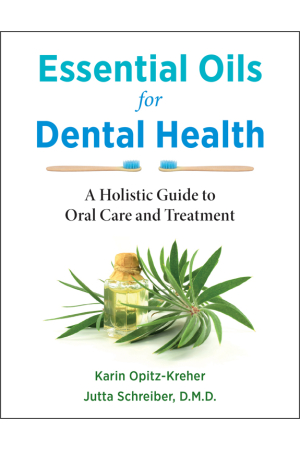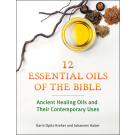Essential Oils for Dental Health
A Holistic Guide to Oral Care and Treatment
- Pages: 128
- Book Size: 5.75 x 7.5
- ISBN-13: 9781644115787
- Imprint: Earthdancer Books
- On Sale Date: September 27, 2022
- Format: Paperback Book
- Illustrations: Full-color throughout
In this comprehensive guide to holistic dental self-care, authors Karin Opitz-Kreher and Jutta Schreiber, D.M.D., detail how essential oils offer many effective and natural ways to support oral health. They share simple practical techniques to easily incorporate essential oils into your daily routine and detail how to combine oils to alleviate specific ailments.
• Offers many simple practical techniques to easily incorporate essential oils into your daily oral care routine
• Includes recommended oil mixtures targeted to alleviate specific dental and oral ailments, such as periodontitis, oral herpes, ulcers, teething, dry mouth, bad breath, teeth grinding, and toothache
Healthy teeth in a healthy oral environment play a key role in physical and mental well-being. We all want to preserve our teeth intact for as long as possible, and essential oils allow us to do so in a natural way. These precious "stars" from the plant kingdom promote oral hygiene and prevent a range of dental ailments, including caries and periodontitis. They can even help alleviate a fear of going to the dentist.
Experienced essential oils expert Karin Opitz-Kreher and holistic dentist Jutta Schreiber, D.M.D., have combined their expertise to explain in clear, accessible, and practical terms how to use essential oils for oral health. Learn all you need to know about what factors to consider when buying oils, which methods to use for different treatments, and how to apply them safely within the mouth. Sixteen recommended essential oils and various oil mixtures are discussed, all with beautiful four-color illustrations. Discover their safe application and health benefits through the focused expertise and knowledge of the authors. The simple and practical techniques in this fascinating book will help to preserve and enhance your dental and oral health.
The Relationship between Essential Oils and Teeth
We have been taking advantage of the calming powers of essential oils in my clinic for twenty years now (writes Jutta), and for me it’s the most natural thing in the world to have some relaxing citrus oil in the surgery. The first thing many patients notice when they walk into a dental clinic is its sterile smell, so it’s no wonder that those who had bad childhood experiences at the dentist are immediately transported back in their memory and feel an associated chill down the spine.
If a patient is extremely tense, treatment under general anesthetic may be the only option, but I have firsthand experience of the difference essential oils can make in this regard. To be met by the welcoming, sunny fragrance of oranges as a patient opens the clinic door soon works its magic, putting a relaxed smile on their face before they even know it.
Initially, we mostly used essential oils for aromatherapy in the clinic, but over the last few years they have been increasingly used to help prepare and support a treatment. Essential oils can be applied externally but can also help with internal oral hygiene, and it’s easy to make use of their positive properties in your own home.
It is my aim through the course of this book to introduce you to a number of essential oils that we use in our clinic both extensively and on a daily basis, and that can also be used at home to boost dental health or prepare for a visit to the dentist.
It is vital that the essential oils used are natural—synthetic scent molecules will certainly dock with the appropriate receptor cells, but they are not natural and when absorbed by the body, they put an enormous strain on the liver.
If your dentist does not use essential oils to create a pleasant environment, take the matter into your own hands by putting a small drop of orange oil on your palms, rubbing them together, and then cupping both hands over your nose to breathe in the scent. If it is a high-quality essential oil, you will notice a change immediately. Everyone reacts slightly differently to particular scents, but most people associate the odor of oranges with freshness, sunshine, relaxation, and vacations.
Methods of essential oil use
There are a number of different approaches to the use of essential oils.
• The German school works principally with the sense of smell, such as with the oil being inhaled directly from the vial.
• The British school advocates mixing essential oils with a base oil and applying them to the body.
• The French school works with undiluted essential oils on the body, preferably applied to the reflex zones on the hands and feet.
Experiment to see which approach suits you best. As a general rule, the specific situation and the nature of the user will determine the preferred method.
If you’re out and about, or even visiting the dentist, fill a roll-on bottle with a little carrier oil (a fatty oil such as almond, olive, or sesame oil) combined with a few drops of essential oil. Dab some on your wrists or neck while you’re on the go.
For massage of the marma points (see p. 30) or the trigger points (see p. 33), it is advisable to mix essential oils with a carrier oil (for example, sesame, coconut, or olive oil).
Combining an essential oil with coconut or sesame oil allows it to be applied internally in the mouth; otherwise, undiluted essential oils can be too harsh on the gums. Do note that water intensifies the effects of the oils. Think of the burning sensation in the mouth after eating a hot chili pepper and how it makes the sensation worse when you drink water.
You can also use a drop of essential oil to massage the reflex zones on the soles of the feet or the palms of the hand. Since taking off shoes to massage your feet is generally not an option during the day, instead massage your hands, perhaps on a bus or train journey. When you massage your fingertips, for example, you focus on the reflex zones that correspond to your teeth. The people around you won’t even notice.
When you are out and about, keep a small vial of essential oil in your coat pocket or bag and inhale its scent briefly when you feel the need to relax—filling a room with the scent (such as in a public building) is not always appropriate.
We routinely absorb a great number of substances that can be detrimental to us via our lungs and skin, as well as through our diet, water, and cosmetic products, so it makes sense to use products that are as natural and free of toxins as possible, particularly in oral and dental hygiene. Essential oils are effective and versatile in this respect, as they can be used in so many different ways to support a range of healthy functions throughout the body.
Essential oils have many effects and applications, bringing physical, emotional, and mental equilibrium. A plant that has a beneficial effect when applied orally can also sometimes influence other areas. As a rule, we always recommend using essential oils that have been distilled to retain all the active ingredients. Some plants are not yet available as an essential oil of this quality, in which case we recommend using the next best oil available; the point is to achieve the best results, rather than being dogmatic about which oil to use. The key is that everything is sourced naturally and is not synthetic.
Top tip for fear of the dentist: Orange and lavender
Scientists at the University of Vienna discovered that the scent of oranges and lavender can help to deal with anxiety (although women were found to have responded to these scents far better than men). Studies at Mie University in Japan also confirmed this calming effect.
Orange (Citrus sinensis)
Botanical family: Rutaceae (rue or citrus family)
Orange essential oil is cold pressed from the peel.
Among its other properties, the scent of orange essential oil induces feelings of calm and cheer. It promotes a sense of well-being in most people, evoking sunny vacations in warm climates.
Do note that you should not apply orange oil to areas of skin that will be exposed to direct sunlight over the following twenty-four hours. It increases the skin’s sensitivity to light and its susceptibility to sunburn. Routine application of the oil to the foot area works well.
Studies at the University of Arkansas have established that orange oil is effective against the Staphylococcus aureus bacterium, which should come as no surprise since plants form essential oils in order to protect themselves from viruses, bacteria, and mold. Distilled oils boast this protective property in even more concentrated form.
Other studies (such as those published in the Journal of Advanced Biomedical Research) report that the heart rate and cortisol levels of anxious patients were reduced when exposed to the scent of oranges, so reaching for a vial of orange essential oil in challenging, stressful situations should certainly help.
Top-quality orange oil still offers value for money and its versatility means it can be used in a variety of ways. Its scent can provide support in various everyday situations, and it helps with general stress reduction and in preparation for an appointment with the dentist. Some suggestions:
• Use with a diffuser as a room fragrance in the home.
• A roll-on (0.17 fl oz/5 ml) neutral carrier oil such as almond or jojoba oil, plus 5 drops of orange oil) for dabbing on the wrist.
• Rub a drop onto your palms and cup your hands over your nose to inhale the scent. Note how your breathing and posture slowly relax.
• Massage of the marma points (see p. 30) or trigger points (see p. 33).
The Relationship between Essential Oils and Teeth
Fact Box: How we smell things
Why essential oils differ in quality
Methods of essential oil use
Reflex zones on the hand
Reflex zones on the feet
Orange (Citrus sinensis)
Lavender (Lavandula angustifolia)
Applying essential oil to marma points
Massaging trigger points
Directing energy using mudras
Dealing with fear
Maintaining Oral Health
The impact of healthy teeth on self-esteem by Maria Kageaki
Key essential oils and how to use them to support oral health
Manuka (Leptospermum scoparium)
Australian tea tree (Melaleuca alternifolia)
Lemongrass (Cymbopogon flexuosus)
Sage (Salvia officinalis)
Oregano (Oregano vulgare)
Fact Box: Essential oils and homeopathic remedies
Clove (Syzygium aromaticum)
Treating oral health problems
Periodontal pockets and diabetes
Unhealthy teeth and rheumatism
Heart health Hormones and dental issues
Periodontal problems
Oral candidiasis
Mouth sensitivity
Toothaches
Teething problems in infants
Fact Box: Using essential oils for babies and children Wisdom teeth Mouth ulcers
Cold sores
Dry mouth
Tooth decay
Fact Box: Coconut oil for a healthy, tooth-friendly diet
Oil pulling
Copaiba (Copaifera reticulata)
Bad breath Myrtle (Myrtus communis)
Rosemary (Rosmarinus officinalis)
Spearmint (Mentha spicata)
Thyme (Thymus vulgaris)
Stress and teeth
Essential oil "stars"
Rose (Rosa damascena)
Lemon balm (Melissa offi cinalis)
Sandalwood (Santalum album)
Epilogue
Recommended reading
Picture credits
About the authors
Healthy teeth in a healthy oral environment play a key role in physical and mental well-being. We all want to preserve our teeth intact for as long as possible, and essential oils allow us to do so in a natural way. These precious "stars" from the plant kingdom promote oral hygiene and prevent a range of dental ailments, including caries and periodontitis. They can even help alleviate a fear of going to the dentist.
Experienced essential oils expert Karin Opitz-Kreher and holistic dentist Jutta Schreiber, D.M.D., have combined their expertise to explain in clear, accessible, and practical terms how to use essential oils for oral health. Learn all you need to know about what factors to consider when buying oils, which methods to use for different treatments, and how to apply them safely within the mouth. Sixteen recommended essential oils and various oil mixtures are discussed, all with beautiful four-color illustrations. Discover their safe application and health benefits through the focused expertise and knowledge of the authors.
The simple and practical techniques in this fascinating book will help to preserve and enhance your dental and oral health.
Karin Opitz-Kreher has qualifications in aura soma, aura soma bodywork, and foot reflex zone reharmonization. She works in her own wellness clinic, specializing in stress reduction and harmonization. Karin has been making use of traditional knowledge of essential oils and passing this on to others in workshops since 2013.
Jutta Schreiber, D.M.D., has been working as a dentist for more than thirty years, specializing in holistic and naturopathic approaches at her own clinic in Neubi berg, Germany. Her methodology includes materials testing and exclusion, identifying interference zones, homeopathy, anthroposophical techniques, bioresonance, matrix rhythm therapy, and much more. She has also been using essential oils successfully in her clinic for many years. Since 2022 Jutta has worked with various dental practices as a consultant on dental and oral health, applying her knowledge and expertise in the field of essential oils.

















